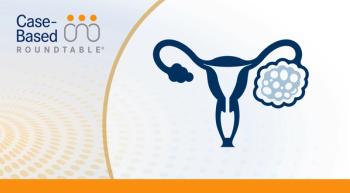
Endometrial Cancer: Factors in Selecting First- and Second-Line Therapy
An expert gynecologic oncologist shares her perspective on treatment options available to patients in the first- and second-line settings of endometrial cancer.
Episodes in this series

Case 1:A 64-Year-Old Woman With Recurrence of Endometrial Cancer
August 2021
Initial Presentation
- A 64-year-old postmenopausal woman presented with abnormal uterine bleeding lasting 4 months
Patient History, Lifestyle and Clinical workup
- She notes that she underwent menopause at 55 years of age
- She is a widow, has no children, and lives alone
- PMH: arthritis, obesity (BMI=40), hypertension well controlled with medication
- ECOG PS=1
Initial Diagnosis and Treatment
- Endometrial biopsy results:
- Endometrioid adenocarcinoma
- Stage IA, Grade 1
- IHC/Molecular testing results:
- Mismatch repair deficiency (dMMR)
- MSI-H
- 3+ ER-positive
- The patient is counseled on surgical options and scheduled for surgery.
July 2022
Presentation at Recurrence
- Patient reports chronic pelvic pain over 4 weeks
Diagnosis of Recurrence
- CAP CT suggests relapsed/metastatic disease with involvement of 1 right external iliac lymph node
Treatment for Recurrence
- Carboplatin/paclitaxel (6x Q3W cycles) was administered.
- Chemotherapy was well tolerated, and a complete response was recorded at end of regimen.
February 2023
Diagnosis of Recurrence
- Disease relapse is documented on routine follow up.
- CT CAP shows heterogeneously enhancing mass in right suprarenal space, multiple bilateral pulmonary nodules, and a new right internal iliac lymph node (in addition to the previously observed positive lymph node)
- Fine needle aspirate of the suprarenal mass confirmed metastatic endometroid adenocarcinoma.
- The patient was counseled about systemic therapy options, during which she repeatedly expressed concerns about side effects.
- Dostarlimab was initiated with partial response noted on CT imaging 4 months after initiation
Transcript:
Ritu Salani, MD, MBA: So to determine the first-line therapy options for mismatch repair deficient endometrial cancers, this has really been an exciting area and actually [has been] changing in the past few weeks. At the timing of this case, this patient would have been a candidate for systemic therapy with platinum and taxane-based regimen, which is the standard therapy for these patients. Then second-line therapy may have been informed by her mismatch repair deficiency. Now with the presentation of [the phase 3] RUBY trial, which looked at the addition of dostarlimab to chemotherapy in patients both with proficient and deficient mismatch repair proteins as well as [the phase 3 NRG-GY018 trial,] which looked at the addition of pembrolizumab chemotherapy in the same setting. Both of these studies showed that there was an impact, particularly in [patients with deficient mismatch repair protein, showing survival advantage with the addition of a checkpoint inhibitor—either dostarlimab or pembrolizumab—to chemotherapy in these patients in the frontline setting.
Going back to our case, the patient had received carboplatin and paclitaxel as her first-line option. At the timing, that was the standard therapy. Giving 6 lines of therapy, assessing that she had a complete response would be the appropriate therapy. In this case, where a patient has kind of isolated disease, the role of radiation could be debated. However, it’s not standard, and chemotherapy would be the standard therapy at that time.
So in this case, this patient progressed after receiving systemic chemotherapy alone, and as she has mismatched repair deficiency, treating her with a single-agent or monotherapy checkpoint inhibitor would be ideal [because] she has the biomarker that portends a favorable response to this. There are 2 FDA approvals for this: dostarlimab, which this patient received every 3 weeks times 4 cycles—that can be adjusted and then transitioned to 6 weeks; or pembrolizumab, which can be given every 3 weeks or every 6 weeks. In this case, giving dostarlimab or pembrolizumab makes perfect sense because she has that mismatched repair deficiency. This patient received dostarlimab, tolerated therapy well, and had a favorable response.
When choosing the specific checkpoint inhibitor, we’re fortunate to have several options; however, different factors may influence your decision. Some things that may come into mind are your familiarity with the specific checkpoint inhibitor, what’s on your formulary, or what’s available to your institution. Other factors may include the schedule or the convenience to the patient. In regard to different checkpoint inhibitors, I do think the class effect is similar. Risk factors usually are not something that are very different between the different checkpoint inhibitors. This rarely influences my decision. In this case, where we have dostarlimab and pembrolizumab, the scheduling is probably the biggest point of difference as the response rate’s efficacy are very similar between the two. So having the option of something that can be stretched out to 6 weeks per cycle after a few kind of induction cycles is a nice option. Although both of them have the 6-week schema, this is something to consider.
Transcript edited for clarity.




















